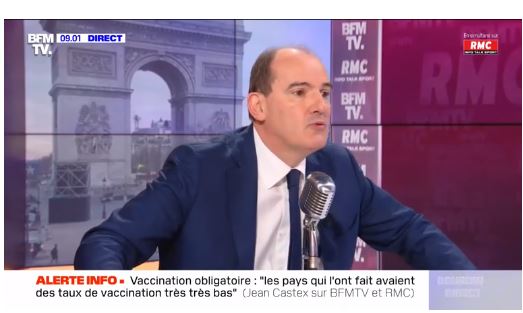
Jean castex’s communication, between political necessity and the risks of omnipresence
Everywhere. Since being appointed on July 3rd, French Prime Minister Jean Castex has utterly been everywhere. He is physically everywhere: visiting a training centre in Besançon (July 23rd), a neighbourhood plagued by insecurity in Nice (July 25th), a women’s shelter (July 30th), a NGO platform of social action in Paris (August 2nd), an hospital in Montpellier (August 11th), the Orly airport (August 14th), , the summer school of the MEDEF (August 29th), etc. Jean Castex also publicly addresses all matters: fighting against drug trafficking, reorganization of hospitals, tribute to the French Resistance (Daniel Cordier) and to Frenchmen killed in Niger, the economic recovery, youth employment, ecological transition, learning camps, etc. Accompanied by relevant ministers who were asked to remain silent under their masks.
A man who was almost unknown to the general public two months ago has since been hard to miss, first during trips intended to highlight the government’s priorities and its support to professions in crisis. Then, his speeches gradually shifted to call for strengthening the mobilization against the pandemic. The new Prime Minister has openly sought to impose his presence and made his approach to government action educational. His stance was one of calm, assurance, firmness and listening, with a southern accent to back it up. The goal was achieved, but this does not guarantee a steady autumn on the political battlefield.
The Prime Minister’s omnipresence lends credibility to the President’s new strategy.
In the short term, Jean Castex has done the right thing: he has shown public opinion a new government, which is neither resting nor giving respite on the brink of a historic economic crisis and at a time when the pandemic seems to be picking up again. The worst thing for his image – and the President’s – would have been for the executive to appear missing or paralyzed at a time marked by uncertainty about the severity of the economic crisis and concern about the relapse of the pandemic.
On the contrary, his omnipresence in the media gives the Prime Minister the opportunity to embody the political turning point that the President seeks. He achieved it despite a political continuity that the government’s line up betrays and a peak in popularity reached by his predecessor, Édouard Philippe (the current “favourite French political personality”, according to polls). Jean Castex’s omnipresence thus serves Emmanuel Macron’s strategy: to make the most out of the remaining “600 days” between now and the next presidential election. It makes it possible to build on a series of announcements as a sign of the government’s determination. Billions of euros have been unlocked from the national budget to help the automotive industry, the indebted hospitals, the winegrowers, public research, and counting. This “budgetary state of grace” benefitted the new Prime Minister, who was generally spared criticism in his early days, while the opposition remains relatively silent in the face of sectoral measures that were difficult to criticize a few months before new elections.
Meanwhile, the President remains active but allows himself to be more selective in his speeches, and his government is free to work on what comes next… Yet it is precisely for what is to come that concerns arise, as a communication strategy purely dependent on the omnipresence of Jean Castex may find its limits.
The risks of communication by the omnipresence of the Prime Minister
A new chapter will unfold in September. Once all recovery plans will be unveiled – even in times of crisis, public finances are not limitless – the government’s communication will no longer be able to rely solely on effective announcements and the Prime Minister’s omnipresence. Increasing bad news, layoff plans from companies of all sizes and a likely relapse of the epidemic will turn a great summer for Jean Castex into a rainy autumn or even a social or political storm.
Lately, an aggravation of the health crisis is already jeopardising the Prime Minister’s credibility, built on his good performance as former inter-ministerial delegate for the progressive end to lockdown measures. The latest IFOP-JDD barometer published on August 23rd shows that this is not pure speculation since the Prime Minister has lost 7 points of popularity in one month : he now sits below the 50% satisfaction mark. The President shall sooner or later take the lead back and propose the country a global vision backed by clear strategy and objectives, which he did not really succeed in doing during the first three years of his mandate. In the 5th Republic, the President’s communication remains the keystone of political life.
